I first watched Khamoshi when I was a child (and too immature to really understand it). I last watched it as a teenager, more able to appreciate the film—which left a handful of clear, sharp images burnt into my memory: Dharmendra, looking out over a balcony and singing Tum pukaar lo; Dharmendra flinging a glass of water at Waheeda Rehman and then watching, half-bemused, half-shy, as she laughingly wipes her face against the front of his shirt. Waheeda Rehman, clinging to Rajesh Khanna but thinking of Dharmendra.
So, considering that this last week saw Dharmendra’s 74th birthday (on December 8th), and having read some very enjoyable posts by fellow bloggers: I decided it was time to re-view and review Khamoshi. It came as a bit of a surprise to realise that Dharmendra actually appears onscreen for just over 5 minutes (and that includes a song). The male lead is Rajesh Khanna. And the film belongs to Waheeda Rehman.
It’s a simple, uncluttered story. Radha (Waheeda Rehman) is a nurse at a mental hospital that’s presided over by the dictatorial Colonel-Doctor (Nasir Hussain), an ex-army doctor. Also on the staff are another doctor (Iftekhar) and the matron (Lalita Pawar).
We enter the story when an ex-patient, the former occupant of Room #24, is being discharged. We don’t see the man; there’s just a long shot from a balcony high above the ground, of the car as it begins to move away. From the balcony, Radha looks down sadly, and her thoughts appear in a voiceover: that Dev is gone; and that she, though her heart was breaking, put on a brave front and saw him off smiling.
A hint of what lies in Radha’s recent past is revealed indirectly at a meeting in the hospital. The Colonel-Doctor is busy preening himself at the success of the experiment he did on Dev. This is a breakthrough, he says: if this research proves right, medical science pertaining to mental health may be able to dispense with medication and electric shock therapy to cure insanity. Dev suffered from acute mania, a condition that was cured because of Radha’s diligence and care of him.
Room #24 should be reserved for this research, says the Colonel-Doctor, and the next patient to be admitted in that room should also be someone suffering from acute mania.
This, it emerges, is a young writer called Arun Choudhary (Rajesh Khanna). Arun’s wealthy parents are long dead and his siblings have dissociated themselves because they don’t approve of him writing (yeah, we writers are a despicable lot!). Now, Arun’s girlfriend Sulekha (Snehlata) has also ditched him, leaving him a trembling misogynistic wreck who sees Sulekha in every other girl—or imagines that every other girl is a friend of Sulekha’s, come to torment him.
Arun’s friend and roommate Bihari Lal Gupta (Anwar Hussain), who’s almost father, brother and uncle to Arun, is anxious about his friend’s condition and has applied for Arun to be admitted to the mental hospital.
…which is a piece of good news for the Colonel-Doctor, who immediately decides to have Arun as the next subject of his research. He calls for Radha and tells her that she will now have to give Arun the same treatment she gave to Dev. If they’re able to cure Arun too, the research will be considered successful.
Much to her boss’s surprise and displeasure, Radha refuses. She’s obviously very distressed about it, but other than being huffy about her refusal, the Colonel-Doctor makes little effort to get to the bottom of things. He tries to get her to agree by bullying her and using emotional blackmail (you are committed to cure patients, you cannot shirk your duty, blah blah), but it doesn’t work.
The Colonel-Doctor next turns to Beena (Naina, very helpfully identified by bollyviewer), a colleague of Radha’s. Beena observed a good bit of Radha’s ‘treatment’ of Dev, so the Colonel-Doctor thinks she’d be able to try the same treatment on Arun.
In the doctor’s conversation with Beena, the logic (or whatever) behind this particular form of treatment emerges. He explains the basics of psychological behaviour in children and adults, tells her about the Oedipus and Electra complexes, and ends by saying that in cases of acute mania brought on by a ruined love affair—for example Dev or Arun—a cure may be possible if the patient is able to see a mother figure and a lover in someone with whom he can strike a rapport. This is what Radha had done in Dev’s case. This is what the doctor wants Beena to do for Arun.
Beena agrees, but despite her best efforts, she can’t succeed. Arun is wary of her, mistrusts her every attempt to form a rapport with him, and eventually attacks her, just as a passing Radha rushes to Beena’s rescue. Arun inadvertently hits Radha, and her matter-of-fact reaction (not the hysterical screeching of Beena) immediately helps calm him and warm to Radha.
So Radha, still somewhat reluctantly, decides to take up Arun’s case. The Colonel-Doctor and the matron, both of whom have been passing snide remarks all this while, are glad that she has finally woken to her duty. But Radha knows this is going to be a difficult task. Her boss firmly believes that all Radha is doing is acting out a part: pretending to be the love interest of a deranged man, giving him affection and warmth to bring him out of the madness into which he’s withdrawn. How difficult is it to act a part?
What nobody knows is that for Radha, Dev had become not a clinical subject but the man she loved. This emerges in brief snapshots, nearly all of them triggered by something Radha sees or thinks or hears. Arun’s back, as she tries to put him to sleep one evening, becomes Dev’s back as she leans fondly against it. Water splashing on her face from a boat on which she and Arun go sailing becomes water that Dev had thrown in her face. And the rocking chair on the balcony of Room #24 reminds her of Dev sitting in it, singing Tum pukaar lo even as Radha stood at the door, devastated after hearing that Dev’s ex-girlfriend had come back and they were getting married.
Slowly, sadly, Radha sinks into a morass of depression, haunted by her memories of Dev. There is one consolation, though: Radha’s companionship is working a cure on Arun. But… he’s falling in love with Radha, and thinks it’s reciprocated.
This is an offbeat, intense film, typical of the director, Asit Sen (who also directed the excellent Anokhi Raat, Mamta and Safar, among others). There are no dramatic twists in the plot, and just a thread of comic relief—mainly in the interactions between the visiting Bihari and the patients of the mental hospital, especially a young man played by Deven Verma. Most of the 2 hours of the film are devoted to the gradual disintegration of Radha. She’s never a completely happy woman (except in the very occasional flashbacks of when she’s with Dev), but even the confidence of the professional nurse begins to crumble away before the agony of a woman unable to reconcile to the growing realisation that the man who now loves her is not the man she loves—and that the man she loves will never be hers; will never even know she loves him.
What I liked about this film:
The acting, most of all Waheeda Rehman’s. In one traumatic scene, she says, “Main acting nahin kar sakti!” (“I can’t act!”). Never, never. She is superb in this, as the repressed and inexpressibly unhappy woman forced into pretending a love she doesn’t feel.
Rajesh Khanna is good too, though sometimes a little over the top as the ‘mad man’. Watch him in the lovely Woh sham kuchh ajeeb thhi, however: he’s very believable as a man so blindly in love with a woman that he’s convinced himself she loves him too. His utter gorgeousness doesn’t hurt, either!
And that brings me to another song, my favourite from Khamoshi, although I like all the songs. Tum pukaar lo, sung in Hemant Kumar’s glorious voice (he composed the music for the film too). This is a masterpiece: the words, the music, the voice and the picturisation all create a hauntingly beautiful image of a deep, aching yearning that is impossible to fathom: expressed in Dev’s voice as he walks restlessly about the balcony, and mirrored in Radha’s face as she realises that Dev doesn’t love her—has never loved her, in fact. Brilliant.
The symbolism. Radha’s khamoshi—her silence, her self-imposed suppression of what Dev’s cure has done to her emotions—is her undoing, and that khamoshi is carried forward throughout the film. It begins and ends in silence, not with the music that usually accompanies the credits or The End. Some of the most poignant moments of the story are played out in utter silence. Even the songs are unusually few for a Hindi film: just four, including the lovely Humne dekhi hai un aankhon ki mehekti khushboo.
While on the subject of symbolism, was I the only one who thought the names significant? Other than Radha, Beena, Dev and Arun, none of the other staff members or patients of the hospital are ever named, and even the names of the main characters seem to me symbolic. Dev (‘deity’) is really almost a deity for Radha, the unattainable, almost-perfect object of her affection, to whom nobody can ever match up. And Radha (the name of the principle devotee of the god Krishna) is, obviously, the principle devotee of her Dev… so blinded by her love for him that she is unable to let go long enough to see the dawn (arun means dawn, by the way). I haven’t figured out Sulekha (‘she who writes well’) yet, but it just may be irony—Sulekha stole one of Arun’s poems and recorded it in her voice, using it to boost her own career as a singer. She isn’t a writer (except of later-regretted love letters to Arun), but she has no qualms about stealing other people’s writing.
And Dharmendra, though he’s hardly there in the film (even the credits list him not as part of the cast, but as a recipient of ‘sincere thanks’), is actually a vital presence in the film. Dev appears in only a couple of scenes—and even in those, it’s mostly his back that we see; only one frame shows his profile, for perhaps 2 seconds—but he’s always there, the thought of him overshadowing Radha’s life, her relationships, her very sanity. No wonder I recalled Dharmendra most vividly from Khamoshi.
What I didn’t like:
The Colonel-Doctor. My God, how this man got on my nerves. He was the most utterly insensitive creature imaginable, completely oblivious to Radha’s emotional turmoil, blind to the fact that she had fallen in love with Dev—and trying to heedlessly bulldoze her into repeating it all over again. If this had simply been a case of very good acting by Nasir Hussain, I’d probably not have been so irate; what riled me was that the dialogue (“only a woman’s love and caring can heal a tortured mind”) and the screenplay seemed to suggest that it was right for a woman to be bullied into putting her emotions on hold simply to participate in an experiment. I hope this was supposed to be a sarcastic look at how insensitive some people can be.
Which, by the way, brings me to a related point: the science of it all (or the lack of it thereof). This sounded uh-huh to me. Pretending a romantic love to cure a patient? Really?
And the supposed loonies wandering around the hospital were too stereotyped. There have been too many of the laughing-singing-screeching-long haired lunatics in films like Khilona, Pagla Kahin Ka, Anhonee, etc, to make Khamoshi very different. Deven Verma’s character is a little more restrained, but not enough to make it refreshingly so.
Not a happy film by any stretch of imagination. But a film worth watching, and one you’ll almost certainly not forget.
Lastly, on request from harvey, here’s a screen cap of Lalita Pawar, in one of the scenes where she’s being sarcastically nasty to Radha for having refused to ‘treat’ Arun.

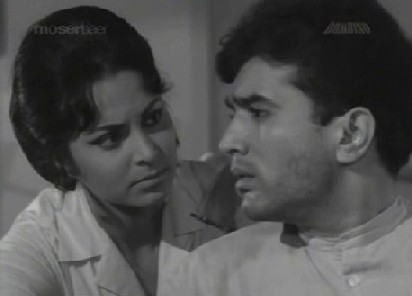
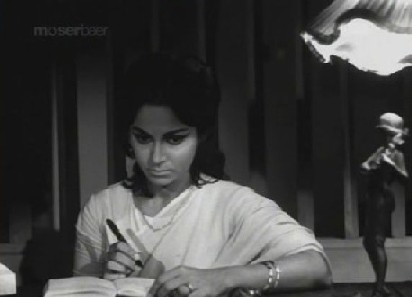
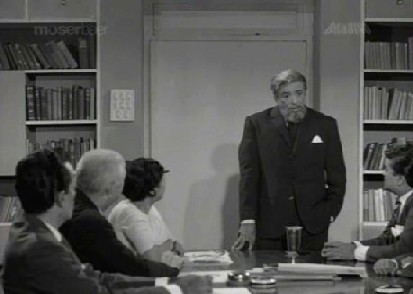
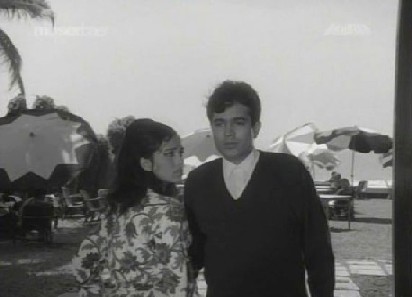
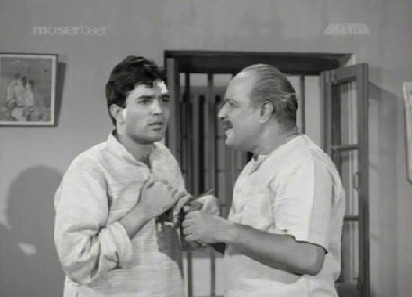
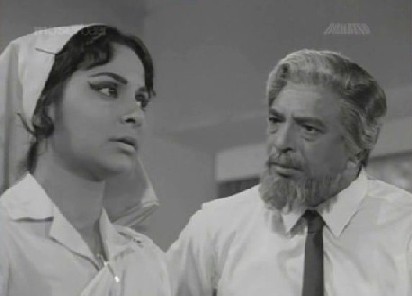
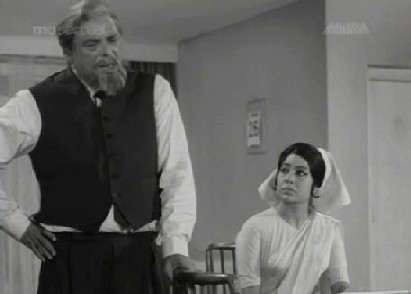
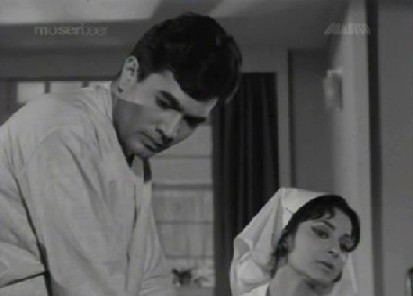
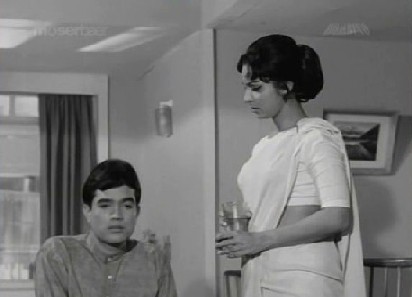
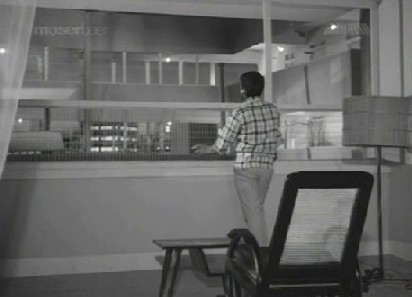
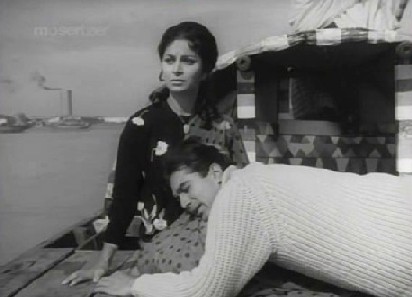
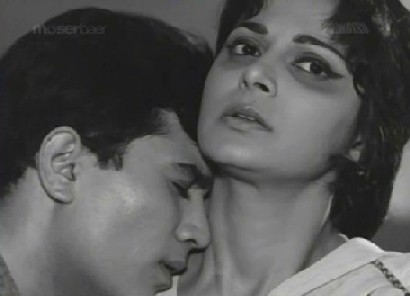
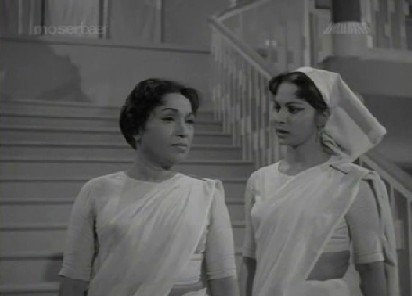
Well, it’s no worse than Hitchcock’s strange ideas about psychiatry. I sometimes think maybe Tom Cruise must be thinking of all the Hitchcock movies he’s seen when he goes off on a rant about the evils of psychiatry.
As an intimate character drama though, as you say, Khamoshi is amazing. Waheeda totally kills it.
LikeLike
I don’t know why I keep putting this one off…maybe because I know it is sad. But Asit Sen is one of my favorite directors! He really gets the whole STORY thing :)
LikeLike
Oh Khamoshi!
My relationship with this movie is just like yours, though I still have to ‘evolve’ to your stage. But I have very good memories of the movie.
Didn’t Suchitra Sen play the role of Radha in the original. I think she got the National Award for that.
I always find myself wondering why the director took Waheeda Rehman for the role. I would have thought he would take the original Suchitra Sen or Sharmila Tagore. Not that Waheeda doesn’t suit the role. She is perfect in it. But at that time atleast I have a feeling that Bengali directors preferred Sharmila. I know there are exceptions, Most probably it is only a sort of cliche in my mind.
Your analysis of the names make sense. Wow, I wouldn’t have thought about that!
How about a screen cap of Lalita Pawar? I missed her! :-(
BTW Radha is NOT Krishna’s wife. Some say that she was married to another person. But you are right she loves Krishna/God and pines for him when he goes away to Dwarka. She is the epitome of LOVE. One can say she was the founder of Bhakti movement. Historically this statement would be a total nonsense. What I meant was spiritually. Narada’s Bhakti Sutras would be at least the theory behind it.
As to Nasir Husain’s character: Many scientists are like that, totally insensitive to things other than their research objects.
Scientifically, I think the story won’t hold water. But emotionaly it does full justice!
Thanks for the review. I think it was a good idea to review a film with a dominant guest appearance of Dharmendra on his birthday! :-)
LikeLike
Sulekha could be the muse of writing? Remember Radha keeps asking him to write – Arun seems ecstatic at some points and defeated immediately after, saying he doesn’t know how his work would end. The muse has spurned him and now he can’t write. The song ‘Woh shaam kuch ajeeb thi’ appears after some degree of healing has been effected.
LikeLike
That sounds very plausible! Yes, I do think that makes sense.
LikeLike
This film and this post of yours has really got me thinking:) I so want to write a blogpost somewhere.
On a different note, with reference to Waheeda Rehman as the leading lady — I’m tempted to think that this film was shot and ready before Aradhana was made but the release got stalled (it’s a United Producers Film) because (a) the subject isn’t really commercial, (b) Rajesh Khanna has a small role in the film but all his previous films were box office duds, (c) it has to rely entirely on the female artist (as Rehman likes to say) for success. Ray made Abhijaan with Rehman in 1962 and even Shyam Benegal is said to have offered Rehman Ankur in the 70s. Sharmila did Aradhana in 1969 so that she could change her image in the Hindi film industry and her last film had caused quite a stir because she was in a bikini. Hence, she couldn’t have been considered for this role at the time. She did, however, do Safar, which was also directed by Asit Sen, and released in 1970 — the same year as Khamoshi. As lovely the film looks, it does look a bit odd to see a black and white film in the 1970. I’m glad it’s a black and white film though, it works so well in terms of the mood, the music and the subject.
I also think it is possible that Rajesh Khanna’s stupendous box office success in 1969 gave a boost to the release and box office success of this film because that’s just how star-driven the whole business is. I love Waheeda Rehman but in the mid to late 60s she and Dilip Kumar managed to star in 3 films together and 2 of them (Dil Diya Dar Liya – 1966 and Aadmi 1967) failed at the box office.
I agree with everything you say about the music, Dharmendra and Rehman. And RK is also lovely each time he says – Radha!
LikeLike
I agree with Waheeda Rehman’s assertion that the film is driven by the female character. The men, while essential to the plot, seem to me not to be the focus, and so it would be essential for the lead actress to be someone of the calibre of Waheeda Rehman – capable of pulling off a role like this.
(P.S. One little nitpick with what you wrote, if you’re referring to An Evening in Paris when you talk about Sharmila Tagore wearing a bikini… she didn’t. She’s in a swimsuit, but it’s a one-piece). Of course you could have meant Aamne Saamne, which I think was around the same time, and where I think she wore a bikini, but I don’t remember for certain.)
LikeLike
Please do nit-pick :) I assumed it was Evening in Paris because in one of her interviews she’s mentioned her attempts to convince Shakti Samanta to allow her to wear a bikini (I remember feeling amused that an actress was trying to convince the director).
Agree with the Waheeda Rehman bit. I have more to add on this but I’ll have to organize my thoughts. Would love to share it with you at some point.
LikeLike
I am confused now, because I checked both Aamne Saamne and An Evening in Paris, and in both she’s wearing a one-piece swimsuit; the bikini-wearing, from what I remember, was for posters: a photo shoot that had nothing to do with any particular movie. Either she’s confused, or there’s some little-known film around that time where she wore a bikini…
I am keen to know more about your views on Waheeda Rehman. :-)
LikeLike
You’re right, it was a photoshoot for a magazine. It isn’t so much about Waheeda but the character – Radha. Your speculation on the significance of the names made me realize there’s a lot more going on in the film. My theory is that if the story of Devdas were to be adapted to a medical setting and focus on Chandramukhi what we’d end up with is the film Khamoshi. It seems very concerned with archetypes and just as Guru Duty kept reworking the archetype of Devdas into films like Pyaasa and Kaagaz ke Phool, to me Khamoshi seems another kind of reworking. Arun no longer has parents and his brothers disapprove of his pursuits. Dev has been reunited with his Paro. Where does all of this leave Chandramukhi/Radha? It’s interesting that there are at least two scenes at the end where Arun and Radha are on either side of a door/threshold. Guru Dutt’s at the end of Pyaasa asks Gulabo “Mere Saath chalogi” and they are at the threshold. In Kaagaz, it’s when he’s fleeing from the studio and Shanti is held back by fans. In Khamoshi, she refuses to meet and isolates herself in a room and finally has had a nervous breakdown (reminded me of Meghe Deke Tara) and is committed to a room. I’ve read in a few places that Rajesh Khanna had a Guru Dutt- Devdas fixation and I’m quite fascinated that his earlier renderings are entirely in films that centre the female character. That’s more or less what I had in mind.
LikeLike
*Dutt* (damn you, auto-correct!) Also the “Main acting nahin kar sakti scene” reminded me of the scene in Kaagaz ke Phool when Shanti meets with the distributors/producers and says “Mujhe acting nahin aati.” Deep Jele Jai was made a few years before Kaagaz ke Phool but these scenes just seemed echoes of each other to me.
LikeLike
Wow. I am very impressed, Jayshree! That had never occurred to me, but now that you point it out (and explain it so well), it makes sense. Thank you – very enlightening.
LikeLike
just love the songs and waheeda….
LikeLike
“I recalled Dharmendra most vividly from Khamoshi.” – its the same with me. I tend to forget that Rajesh Khanna is the “hero”! This has to be the most effective “guest appearance” in films.
I havent re-watched this since I was a teenager, but even then, I remember thinking that the psychology was decidedly dodgy. Since all my Bengali friends claimed that the Bangla original (Deep Jele Jaye) was way better, I got it. But the remembered darkness of the story has kept me from watching that, so far!
LikeLike
The bangla wasn’t oriiginal. It was copied from an English movie.
LikeLike
Isn’t it other way round? There was Holly (and French) adaptation of it? I have never come across any Holly movie which had similar story line – may be I have missed it
LikeLike
No idea… from what I’ve gathered online, Deep Jwele Jaai (which I have also reviewed on this blog) was based on a Bengali short story. So unless the short story was based on a Hollywood (or British film), it doesn’t seem likely that it was borrowed from the West.
LikeLike
I actually never came across similar theme (either in novels or movies) so I thought there is something mising among my 6000 odd movies (starting from silent era Griffith and even some Euro pre-griffith onwards… and ending in pre-modern era say about late 60s). In Medical theme there is an interesting and quite good Bong movie of aproximately same time ‘Kancher Swarga’ – = ‘Brittle heaven’ ? of Tarun Majumdar – (I am not sure it is available with subtitles). This, I am not sure, could be adapted – since story is by Tarun Majumdar himself, and I don’t think he was such a good novelist to think of it – though most probably not from a movie but some story/ novel.
LikeLike
From your screencap, “Beena” looks like Naina, the actress who played Dharam’s sis in Anupama.
LikeLike
I love this movie!!! And thank you so much for reviewing it.
I have had a similar relationship with this movie. Had heard/seen the songs as a kid Tum pukar lo and Woh sham kuchh ajeeb thi . Waheeda walking with Meghdhoot in her hands in Tum pukar lo is my earliest memory associated with this movie.
I had watched this movie as a teenager and had really liked it. I watched it again a couple of months back and it left me mesmerized, yet again.
Waheeda is simply superb, Dev’s name alone is more dominant than Arun’s screen-presence. I totally agree with bollyviewer –
“This has to be the most effective “guest appearance” in films.
Coming to think of it now, your analysis on characters’ names does make sense, wonder if it was intentional or purely co-incidental.
And the songs….I get goose bumps everytime I listen to them esp Tum pukar lo and Humne dekhi hai un aankhon mein
LikeLike
Amrita: Yes, there are plenty of distinctly dodgy psychological problems and their equally dodgy cures in Hollywood – especially in Hitchcock’s films! I think they’ve never annoyed me as much as this one did, simply because the Colonel-Doctor was so infuriating, I didn’t want to listen to him at all.
memsaab: Yes, it’s sad, but Waheeda Rehman’s acting is enough to make Khamoshi a must-see. In this, I think the story isn’t the main thing – it’s the acting, and the gradual revelation of the depth of Radha’s feelings for Dev.
harvey: I must tell my husband that he’s got his facts all wrong – he was the one who told me that Radha eventually married Krishna, though I’d been under the impression that her husband had been someone called Goswami… thanks for pointing that out, will correct it straightaway! And check out the Lalita Pawar screen cap. ;-) Unfortunately, she has a very small role in Khamoshi – she’s credited along with Dharmendra as a recipient of ‘sincere thanks’.
bawa: Same here! It amazes me why Waheeda didn’t get the Filmfare Award for this role (Sharmila Tagore got it for Aradhana, I believe, though personally I feel Waheeda’s is the more poignant of the two enactions).
bollyviewer: I so agree! This is certainly one of the most effective guest appearances I’ve ever seen in films – I was very surprised to discover that Dharmendra actually had such little screen time in the film; my memory was crowded with him, to the extent that I thought Rajesh Khanna was the guest star! Reminds me of someone who commented upon Dean Jagger’s character in Twelve O’Clock High, that even though he played a minor character, his role happened to be a major influence in the film. While Dev isn’t a minor character, I thought his influence in the film was one of the most overriding ever.
PS. Thanks for identifying ‘Beena’! She looks like the woman in the ‘What! You think my bouffant isn’t big enough’ screen cap in your Anupama review.
sunheriyaadein: That shot of Waheeda, the sari pallu billowing in the breeze, Meghdoot clutched in her hands and that stricken look on her face is one of my earliest memories of Khamoshi too. Tum pukaar lo is such a mind-searing song in so many ways!
LikeLike
Rukmini is Krishna’s wife, though he had many others as well.
Though in many spiritual songs Radha is closely associated with Krishna, they never got married. That is why also some regard this love as ‘above’ than others. There can be different interpretations.
Even though Meera regards Radha as a rival in love for Krishna, one can say Radha’s love is similar to that of Meera. Very devotional.
Thanks for Lalita Pawar. She had attitude! I’d have loved to go out with her for a coffee.
Maybe that would be an idea for a list, what?
A list of leading film stars with whom I would luv to go for a coffee, dinner.
and then a list of character actors with whom I would luv to go for a coffee, dinner.
Wow these are four lists!
During the X’mas holidays I can think about it. And I’ve a 14 hr long train ride on 22nd, which I can use for it.
LikeLike
Thanks for that info about Krishna and Radha! My knowledge of Hindu deities is largely confined to Amar Chitra Katha and Sankshipt Mahabharat/Ramayana, the latter having been part of my school syllabus – unfortunately I’ve forgotten most of it, except for being quite mesmerised by the Mahabharat.
You should actually spend those 14 hours making 8 lists, not 4. (Bollywood and Hollywood, hai na? (Though I personally am not really clued into character actors – male or female – in Hollywood. People like Peter Lorre, perhaps, or Judith Anderson (neither of whom I’d like to go out to coffee or dinner with!), but not many others. Lead players from Hollywood, certainly! Just the idea of having coffee and dinner with Cary Grant or Bob Mitchum or Dean Martin makes me go weak at the knees! Or Charles Boyer – he sounds like a very nice person.
LikeLike
Bollywood and hollywood! wow!
that would be a lil bit too much but hollywood be a little bit too much for me.
I will surely make the list for bollywood if I don’t sleep. the train is at 05:45 am.
But if Amazon delivers your book before that, then no list!
Teh problem would also be how to classify the actors and actresses. Is Balraj sahni a character actor or a leading man?
I would have loved to get into a discussion with him about politics. He comes across as somebody with whom you can discuss and trust not to hold a monologue. If you go by Dev Anand’s interviews, he is sure to talk all the time.
Raj Kapoor I think must have been a good conversationalist. But as an actor I prefer Dev over Raj.
Dharmendra for e.g., is a handsome guy, but do you think you can talk with him about minority politics in India? Not that I would be able to concentrate if we do. ;-)
As for Hollywood, I can’t think of anybody. For a date yeah! But for a real good talk. Lemme see…
LikeLike
Yes, Balraj Sahni would be difficult to categorise – but I’d definitely love to have spent time with him! He seems so intelligent and interesting… Dev Anand and Dharmendra would be fun to date, I guess, but a serious conversation? Hmm.
From Hollywood, for a more intellectual conversation, I’d probably still stick with Charles Boyer – this guy had a degree in philosophy from the Sorbonne, so he might have been an interesting conversationalist.
But I’m hoping Amazon gets the book to you before then! :-)
LikeLike
O Balraj Sahni is definitely “leading man” for me! For the rest, I get the feeling that writers (Javed Akhtar and Gulzar, for e.g.) would be a lot more interesting to hang out with (and they were so good looking too!), than most leading men.
For Hollywood – ROCK HUDSON! He doesnt even have to open his mouth. Like Bella (of Twilight), I can just feast my eyes on my hero’s awesomeness! ;-)
LikeLike
PS: While we all wait for your book, how about making us some lists of potential filmi dates.
LikeLike
My filmi date lists (not lists of people who I think would make for stimulating conversation!) would probably be much the same as my eye candy lists! BTW, another Hollywood actor whom I’d really like to have a conversation with – he seems so sharp and witty and intelligent (besides being very handsome) is Christopher Plummer. I’ve been, in the recent past, watching some of his films other than The Sound of Music, and I’m amazed at this man’s acting. Mind-blowing.
And now that I think of it, I’m inclined to agree: Balraj Sahni is lead actor – he only became a character actor much later, and even when he was doing ‘character’ roles (Bhabhi, Chhoti Bahen, Waqt etc), he was a far more powerful presence than other character actors.
LikeLike
I agree with bollyviewer, that the lyricist would make better conversationalists. Javed Akhtar and Gulzar would top my list as well. A. R. Rahman is one person I would really like to meet and have a long talk.
AND
I would like to be silent with Humphrey Bogart!
LikeLike
Like some who have commented here, I keep putting off seeing this film because i know it is sad, especially the ironic ending.
In fact it is this ending which sends a chill down my spine (if I’m not making a mistake and thinking of another film).
I remember my older brother mentioning it and ever since then I have not had the courage to watch it.
LikeLike
harvey: A R Rahman would be on my list too! But Bogart – hmm, I don’t know. He intimidates me.
pacifist: Yes, you’re right – the end is chillingly ironic, especially the very last frame. But, despite that, I feel Khamoshi is worth seeing for the sheer brilliance of Waheeda Rehman’s acting. Also, except for in a couple of scenes, it’s generally not as melodramatic as a lot of other Hindi films tend to be when they try to be tragedies.
LikeLike
LoL at ‘Main acting nahin kar sakti’ i’ll start quoting that as one of my favourite filmi dialogues, who knew Asit sen who usually accepted silly comedic roles had all this in him, i need to see his work as i’ve heard of the wonderful Anokhi Raat lots of times. this was on my list for Rajesh week which i have doubts about, seeing how i was unable to deliver on Dharam week, but its on high priority so i should get it soon, i’ll come back with my thoughts
by THE WAY WHAT ARE YOUR FAVOURITE FILMS of all you’ve reviewed so far on this blog, please do add a tag to denote your favourites, i like seeing or knowing what other people favourite films are
LikeLike
Even though Asit Sen – the comedian – is credited on imdb with being the director of this film and others like Anokhi Raat, I’d read in a book on Bollywood (I’ve forgotten the name) that they were actually two different people. I need that confirmed, but I wouldn’t be surprised if they were two men, not one!
Thank you for that idea of putting a ‘favourite film’ tag on films I review! I’m going to do that the next time I review a film. Till now, of the Hindi films I’ve reviewed, I’d probably classify Sahib Bibi aur Ghulam, Ittefaq, Mr and Mrs 55, Dekh Kabira Roya, Phir Wohi Dil Laaya Hoon, Shikaar, CID and Anokhi Raat as among my favourites. I love and/or admire them all, for some reason or the other.
LikeLike
That is what I heard as well, that there are two Asit Sens, one the director, the other the actor. But then somebody told me that the actor Asit Sen was also a director. Hmm… Now how to find who is who?
BTW, I should have added a ‘;-)’ to my statement “I would like to be silent with Humphrey Bogart!”
@ boolywooddeewana: I will try to say this dialogue at least twice a day and then maybe someday make a song like “Harvey can’t act saalaa”! ;-)
LikeLike
Hmm… I think Balraj Sahni’s autobiography said that comedian Asit Sen was the same guy as director Asit Sen. Will have to re-read and check!
LikeLike
harvey: Ah, so are you part of the ‘Casablanca isn’t a tragedy because Ingrid Bergman doesn’t end up with Bogart’ clan? ;-) That was bollyviewer’s take on Casablanca, and I’m inclined to agree – I’ve somehow never been able to warm to Bogart!
bollyviewer (and everyone else in on this discussion): I’ve been re-reading sections of Subhash K Jha’s The Essential Guide to Bollywood, and in the review of Anokhi Raat he categorically states: “Director Asit Sen (not to be confused with the comic actor of the same name) captured the desperately driven people trapped under one roof with an intensity…”
Jha is a pretty credible film critic, but I’d like this verified by someone I know knows! Waheeda Rehman? Rajesh Khanna? Dharmendra? Parikshit Sahni?
LikeLike
Yes, Asit Sen the director of this film was different from the comedian. This Asit Sen directed some very fine films in Bengali and Hindi. In fact, he directed the original of Khamoshi, Deep Jweley Jai (1959), in Bengali where Suchitra Sen played Waheeda’s role. Great as Waheeda is, Suchitra made the role her own! Deep Jweley Jai is available on DVD with sub-titles by the way. Do catch it if u can.
LikeLike
Thank you so much for clarifying that! Somehow it seemed very difficult to reconcile the buffoonish Asit Sen of Love in Tokyo or whatever with a man who could create such amazingly sensitive films as Khamoshi or Anokhi Raat…
Have put Deep Jweley Jai on my DVD wishlist. Suchitra Sen is another of my favourites, so this is something I’m looking forward to already!
LikeLike
No, I belong to the clan: ‘Casablanca isn’t a tragedy because Rick Blaine ends up with Captain Renault’ !
;-)
Suchitra Sen is a great actress but the last scene of Mamta with the endless loop of “Suparna!” “Maa!” has me in splits everytime! ;-)
LikeLike
“‘Casablanca isn’t a tragedy because Rick Blaine ends up with Captain Renault’ !”
Heheh. Brilliant. :-))
Re; Suchitra Sen doing the Maa-Suparna loop is the perfect example of the sort of scene that makes me squirm in an otherwise good film. There were a couple of scenes in Khamoshi too – for instance, where Radha manages to get Sulekha to come and confront Arun, and the resulting nautanki, with Radha chastising Sulekha and her ilk for having ruined the lives of men like Arun… that was a bit of speechifying that Khamoshi could have done without, I think. Made me wince.
LikeLike
Here’s an excerpt from an interview with Waheeda Rehman on ‘Khamoshi’. The link to the original article is at the end.
“Question: Khamoshi, the story of a nurse who cures two patients in a mental institution, falling in love with both, and becoming mentally ill herself in the end, was a very unorthodox role to begin with. Did you expect it to be as successful as it was, and how emotionally taxing is it to do roles like that?
Answer: I saw the Bengali version with Suchitra Sen and was so moved by it, I would ask all my directors to remake it in Hindi, but they would say you always choose really heavy subjects and a film like will not do well at the box office. One day I asked Hemant Kumar after working with him for Bees Saal Baad, if he would give it a shot. He said if you will do it I will make it and the very next film that he made was Khamoshi. He even retained the same director Ashit Sen who had directed the Bengali version and he was excellent. I thoroughly enjoyed that role, but I was so emotionally involved with it that it really affected me deeply. After Khamoshi was completed I started shooting a movie with Nirupa Roy. We were both considered superb in emotional scenes, but we went through bottles and bottles of glycerin and just couldn’t emote. I realized then that the after effects of Khamoshi were still lingering and had drained me out. Unless you feel the pain you cannot show it and both of us were so flat, empty and drained out. She too had been doing several roles that had been emotionally draining. We had to call the shoot off.
I think the toughest scene, and one that took a lot out of me was where Rajesh Khanna keeps banging at the door asking her to open it. She is silent trying to control herself because the doctor has already reprimanded her and told her she cannot get involved with her patients, but deep within her she knows she is already involved and he is involved too and the silent struggle was very very tough to emote.”
http://www.kavitachhibber.com/main/main.jsp?id=waheeda
LikeLike
In reply to ‘bollywoodeewana’, I believe Asit Sen the director & Asit Sen the comedian are different people …
LikeLike
Suhan: Thank you for that – I can well believe that Waheeda Rehman felt drained after Khamoshi: her performance was superb. But as far as the question is concerned, I don’t quite agree with it – I don’t think Radha was ever really in love with Arun. She had an emotional attachment to him, of course, but probably more one of empathy than anything else. To me, it appeared that any signs of love for Arun were actually moments of forgetting that this was Arun, not Dev.
Jat24: Yes, that seems to be the general consensus.
LikeLike
Dusted Off, but how about Waheeda herself saying “….but deep within her she knows she is already involved and he is involved too and the silent struggle was very very tough to emote”? Also, at the end in the film when she says “Main acting nahin kar sakti” refers to the second patient too, no? Am looking forward to watching the original “Deep Jele Jai” but alas despite Suchitra, there ain’t no Kaka or Dharam :-)
Incidentally, unless someone else has already mentioned it earlier, I believe the director Asit Sen enacted Dharam’s role in the Bong version. There’s a rare pic of him taken during RK’s 1970 birthday party I think with RK and Shakti Samanta. He’s really looks v.v. different from the comedian :-) Lean, sharp featured, with a mustache and quite irascible actually! I’ll try and dig it out and link here.
LikeLike
Yes, now that you mention it, that “Main acting nahin kar sakti” dialogue does seem to indicate that her relationship with Arun isn’t as emotionless as she would want it to be… whatever, it’s a film with so much subtlety and things left unsaid that one can go on drawing conclusions (which is the way I like it)!
I do hope you can dig up that photo and post the link. Thank you in advance! Even though I know this Asit Sen is not that Asit Sen, I always tend to think of him as pudgy and comical – would love to see what he looked like! And I think I should get hold of Deep Jele Jai sometime soon… you’ve given me even more reason to see it. Though I’ll reserve my opinion on whether Asit Sen makes as dashing a first love as Dharmendra. ;-) Even without seeing Asit Sen, I’m inclined to favour Dharmendra!
LikeLike
From both the movies – Original bengali as well as the Hindi version the critical dialogue is “Believe me, I didn’t act… I have never acted… I can’t act” which clearly shows she fell in love with the second patient in the end. Comparing the two ends… whether it is ‘Language’ or Acting I am not sure – but the nuances of Suchitra in ‘ami abhinoy korte pari na’ and Waheeda ‘main acting nahin kar sakti’ are different – though translation is perfect – the ‘Impossibility’ is much more prominent in Suchitra. BTW I am not a Suchitra fan, despite this exceptional performance and a few more very good. Somehow I felt she had somewhat of ‘superiority’ complex (I am the Queen-Regent), even when Uttam is opposite her – and that in either protagonist (ie either gender – the other glaring example, in my view is Dilip) – gives a bad ‘feeling’.
LikeLiked by 1 person
True. Like some people in Hindi cinema (Dev Anand comes to mind), the success seems to have gone to Suchitra Sen’s head. ;-) She’s lovely, and she’s a good actress, but personally, over time, I’ve begun to think Madhabi Mukherjee outshines her.
LikeLiked by 1 person
I didn’t know you have watched so many ‘Bongs’… yes Madhabi is far better as an actress, the difference probably is like Soumitra Vs Uttam – a more complete actor vs one who has the X-factor. Or in Bolly Sunil (Dutt) Vs his contemporaries. Any Good actor or actress is one (in my opinion) … with whom one can ‘Identify’ self while watching – in even impossible circumstances – eg when a hero punches a gang of villains and wins (which is quite impossible, my subconscious knows) – if my fist curls up… that means I am able to ‘identify’, but if it is simply adrenalin, then it’s ‘just relaxing’.
LikeLiked by 1 person
I agree with you – I think that’s the basic difference between someone who may be just a star, and someone who is really a good actor.
I have reviewed quite a few Bengali films on this blog. This page lists all those that I’ve reviewed:
LikeLike
Super Star Rajesh Khanna’s Khamoshi one of classic movie which was released on 23/4/1971.
Super Star Rajesh Khanna’s acting is noticed due to freshness and being pure Super Star Rajesh Khanna was very good and the more footage which he portrayed beautifully in all scenes. His expressions shows of highest calibre. Its really a lovely movie. Hardly any people remember that there was Dharmendra in Khamoshi; however, the whole world know that Khamoshi is a Super Star Rajesh Khanna classic film which will be remembered for ever.
LikeLike
Dear friend Dusted Off I requested you to kindly bring out an article on our Super Star Rajesh Khanna’s birthday which falling on 29-12-2009.
LikeLike
“Hardly any people remember that there was Dharmendra in Khamoshi;”
Ahem. No, I don’t think so! ;-)
LikeLike
As promised, here’s the link to the picture of Asit Sen (the director) with Sunil Dutt, Shakti Samanta and Rajesh Khanna at Rajesh’s birthday party on Dec. 29, 1970. As I said, very different to look at from Asit Sen, the comedian :-)
(In case the link doesn’t work, copy and paste it to the URL and make sure to delete any spaces in between)
LikeLike
Thank you, Suhan! Yes, he does look very different from the comedian Asit Sen – and if he was the one who acted the Dev part in Deep Jwele Jai, then I’d say Dharmendra is definitely the better-looking of the two! But since Deep Jwele Jai was made in 1959 (if imdb is to be believed), he perhaps looked better in it than he did in 1970! (Sunil Dutt certainly was beginning to lose his handsomeness by the time this photo was taken).
LikeLike
I just discovered at my blog (from Tarun Bose’s daughter no less) that Asit Sen the actor did actually also direct two movies: Apradhi Kaun and Parivaar!
Live and learn!
LikeLike
So the director of Apradhi Kaun wasn’t the Asit Sen, of Khamoshi and Safar fame? Wah, thank you – that is interesting.
LikeLike
I remeber discussing about the Asit sen here, thought i’d come back and share a pic of him, its only a side shot but still
LikeLike
Yes, that’s the same one Suhan shared, in her comment above. He looks so different from the comic actor Asit Sen, doesn’t he?!
Thank you.
LikeLike
I believe Waheeda Rehman jee is a timeless beauty.
LikeLike
Awesome write-up on a film that I would describe as one of my favourites but that I’ve only been able to watch once because it made me feel so low when it finished.
Magical soundtrack and briliant acting. I am inspired to watch it again.
I’m a psychiatrist by profession so a couple of years back went to a seminar called ‘Madness in Bollywood’ – and they showed clips of this. As well as Half-Ticket and a few others. Recently 15 Park Avenue with Konkona, Waheeda Rahman and Shabana was very good.
LikeLike
‘Madness in Bollywood’ – wow, that sounds really interesting. Some fairly well-known depictions of it towards the end of the 60s and the early 70s, weren’t there? – in Pagla Kahin Ka and Khilona, for example. Khamoshi is perhaps the only one that actually focuses on it almost completely. It’s an amazing film, and despite the fact that it’s so sad, I wouldn’t mind watching it again…
Haven’t seen 15 Park Avenue. The cast sounds amazing; I must look out for it. Thanks!
LikeLike
Lol
No one remembers Dharmendra in Khamoshi except u !!!!
Khamoshi is a very sensitive movie exceptionally well acted by Waheeda but the fact is without Rajesh khanna she would not have been able to portray her role just as well as she did !!
Dharmendra in Rajesh khannas role would have been a total failure !!
He is quite expressionless and has difficulty emoting !!!
Iam glad he wasn’t in the main lead becoz no one would remember khamoshi now !!!
Waheeda rehmaan got recognised as a serious actress after this movie thanks to Rajesh khanna !!!
LikeLike
Are you by any chance an alter ego of V Manohar, who’s commented above about nobody remembering Dharmendra in Khamoshi? All you have to do is read the other comments too to see that people actually do – and that I’m not deranged for remembering him.
And I’m sorry to burst your bubble, but Waheeda Rehman was already an award-winning actress (for Guide and Neelkamal, not that I like the latter) and nominated for Sahib Biwi aur Ghulam well before Rajesh Khanna acted with her in Khamoshi. So the claim about him making her a serious actress smacks of irremediable Kaka-fandom, I think, not objectivity.
Let us agree to disagree and not make nasty comments about each other’s preferences.
LikeLike
Well your article is quite biased to start off with !!!
Khamoshi is an outright waheeda movie no doubt about that . But rajesh khanna is the lead actor in the movie and not Dharmendra !!!
( and Iam so glad he is not !! )
And your comment about Rajesh being over the top is baseless !
Your article should have talked about Rajesh khannas performance with waheeda rather then dragging Dharmendra in here with his 5 minute appearance !!!
Fact is Rajesh khanna was recommended as the lead role in khamoshi by Waheeda after seeing Rajesh in Akhri khat !!
Why didn’t she recommend Dharmendra ????
Ask yourself that ???
And FYI Khamoshi is the biggest hit of Waheeda not Guide !
LikeLike
I think you did a beautiful job translating the film. The song that was sung as they were on the boat was posted on my blog and I asked for the translation and was linked to your post. Now I have an understanding of it, thank you. It sounds like quite a fascinating and deep movie, yet as you say simple, sometimes those are the best ones!
LikeLike
Thank you, Deb – I’m glad you liked this. Long after I reviewed Khamoshi, I watched the original Bengali film on which it was based (Deep Jwele Jaai) and thought that was even better and more subtle than this one.
LikeLiked by 1 person
😆 My experience with your blog and Memsaab’s has been so good.
LikeLike
Thank you so much! Greta and her blog were the inspiration for this blog – and Greta was the one who egged me on to write my own blog – so that praise means a lot to me. :-)
LikeLike
One of my favourite remembered movies but I have never been able to bring myself to watch it again, it haunts me from a teenage viewing. The songs though – fabulous. BTW, on madness, Shabana Azmi once narrated that she was asked to play a mad person in a movie once. She asked the director – is the character schizophrenic, manic depressic, paranoid…what? the director stared at her, puzzled, and said – nahin. Thoda sa ro do, thoda sa has do, aankhen roll karo – you know, Hindi movie mad!
LikeLike
That anecdote says it all! Wow. I mean, wow. What can one say to that?
LikeLike
1stly Very sensitive Heart toching acting by Waheeda Ji,
2nd ….song written by Gulzar Ji….
very Divine….
सिर्फ एहसास है ये
रूह से महसूस करो
3rd….Credit goes to Director
for sensitiveness of film.
LikeLike
Passionate Review
I liked it for its eye for detail and a heart for the intense emotions
LikeLike
Thank you. I’m glad you enjoyed this.
LikeLike
Very careful analysis of the story, even I couldn’t understand it to this depth that now Rajesh Khanna has really started falling in love with Waheeda.
I remember, by the time the story ends, he too gets well and discharged from the hospital.
I was very sad to see Radha succumbing to the emotional turmoil s she underwent.
LikeLike
Thank you for the appreciation, I’m glad you enjoyed this review.
LikeLike
Watch “Deep Jweley Jai – Bengali – Suchitra, Basanta Choudhury” on YouTube
EXCELLENT PRINT.
Suchitra Sen is glorious. Brilliant photograpjy.
TommyDan55 ..need J say more?
Suchitra the only actir seen in this film.
LikeLiked by 1 person